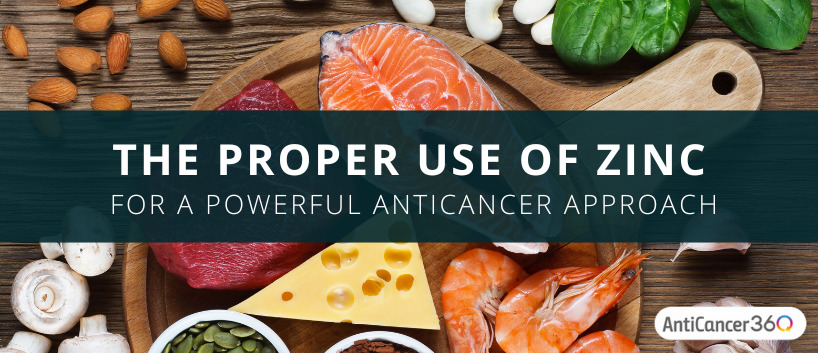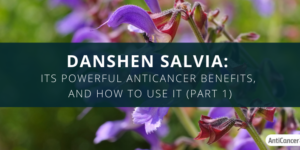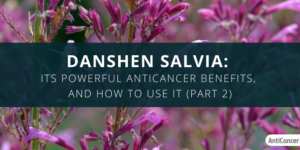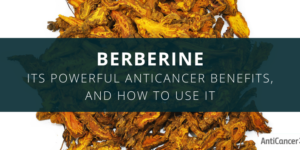If you have recently received a cancer diagnosis or have been in a long term struggle to heal your body from cancer there can be a lot of overwhelming emotions and information. At AntiCancer360 we help you navigate the anticancer world so that you can make the most informed decisions about your individual anticancer approach. Keep reading to learn more about an essential substance/nutrient for winning the battle against cancer.
Zinc Deficiencies Are a Common and Well Known Risk Factor for Developing Cancer
Zinc is an essential mineral for numerous processes in the human body, like detoxification, antioxidation, and DNA regulation. It is a component of more than 300 enzymes and an even greater number of other proteins, which emphasizes its indispensable role for human health. Optimal nucleic acid and protein metabolism, as well as cell growth, division, and function, require sufficient availability of zinc [1].
Research has demonstrated a consistent association with chronically low zinc levels and cancer development [2]. This is especially well demonstrated in cancers of the prostate, liver, and pancreas. Evidence also points to a likely relationship with lung, thyroid, gallbladder, and breast cancer [3].
Unfortunately, deficiencies are quite common, even in developed nations. Low levels of zinc are often associated with aging and chronic illness (gastrointestinal diseases, diabetes, liver disease, sickle cell disease, kidney disease, HIV infection). It can be a result of dietary choices such as low meat intake (vegetarian/vegan diets), excessive phytate consumption (found in legumes, seeds, soy products, and whole grains), oxalate consumption (found in spinach, okra, nuts, and tea), and excess alcohol or coffee consumption [4]. It has been estimated that only 42.5% of the elderly (≥71 years) in the United States have adequate zinc intake [5].
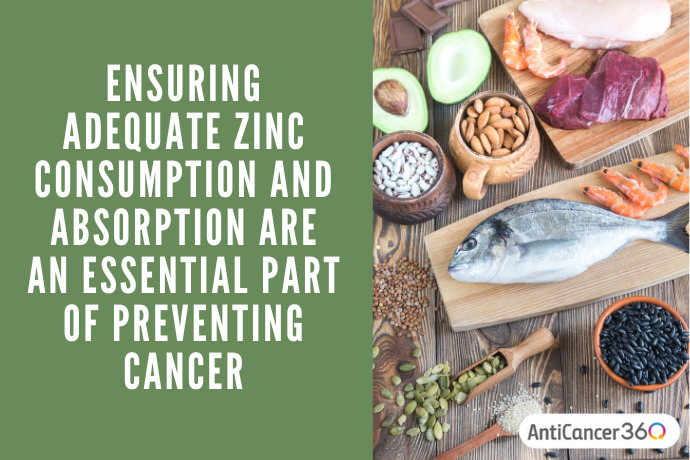
It stands to reason that ensuring adequate zinc consumption and absorption are an essential part of preventing cancer. Consider maintaining a diet rich in high zinc containing foods to prevent deficiency [6]:
- Oysters
- Beef
- Lamb
- Venison
- Sesame seeds (tahini)
- Pumpkin seeds
- Yogurt
- Turkey
- Green peas
- Shrimp
But it doesn’t end there, Zinc is also a powerful ally in destroying cancerous cells and tumors once they have formed. It should be noted that the anticancer effects of zinc have only been achieved at supplemental doses, not the amount you get from food. While having a high zinc diet is shown to prevent cancer, if a tumor has already developed, additional supplementation is needed for zinc to be effective [7].
Zinc Is Deadly to Cancer Cells Via Multiple Mechanisms
Zinc’s anticancer effects are well established. Some of its mechanisms include the inhibition of the cell cycle, cell migration, angiogenesis (blood vessel growth), cell invasion; alteration of cell metabolism; induction of apoptosis; and other effects [8].
Phosphorylation
Zinc has been shown to regulate several phosphorylation-dependent signaling cascades, including MAPKs (mitogen-activated protein kinase ) and AKT (Protein Kinase B), that play important roles in cell development, proliferation and cell death [9].
Apoptosis
Zinc has been demonstrated to induce apoptosis (programmed cell death) in human melanoma cells by increasing reactive oxygen species, FAS Ligand expression (on cytotoxic T-cells), p53 expression, and autophagy [10],[11].
Zinc Fingers
Zinc performs very important functions in the cell by stabilizing zinc finger structures, which play an important role in the regulation of DNA replication and repair, transcription and translation, cell proliferation and maturation, and apoptosis [12].
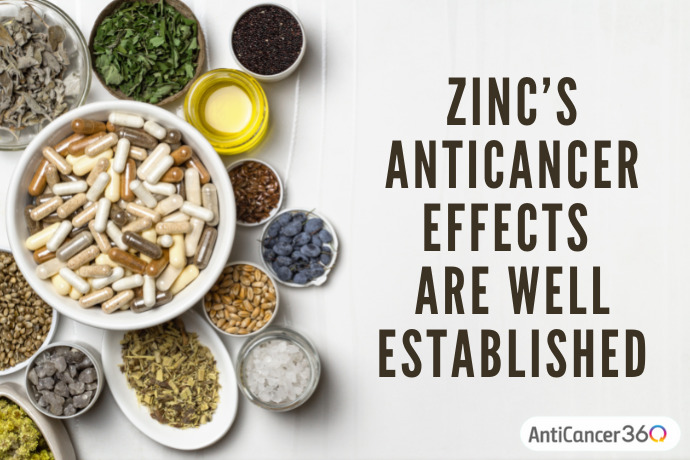
This Stuff Sounds Pretty Toxic… but That’s Only So for Cancer Cells
Interestingly, in tissue cultures, zinc has been shown to protect healthy cells against the damage from hydrogen peroxide (H202), but intensifies the toxicity of H2O2 in tumor tissue [13]. This means that while it’s toxic to cancer cells, it is non-toxic (and protective) to healthy cells. So we can deduce it is safe to consume as part of an anticancer protocol.
Copper Depletion as an Anticancer Strategy
Copper depletion is a novel therapeutic approach against metastatic (spreading) cancers [14],[15],[16],[17]. One of our clever uses of zinc is to supplement it in order to deplete copper levels. Long term, high dose zinc supplementation will deplete copper levels by way of inducing a protein that binds copper, making it impossible to be absorbed in the gut [18].
Zinc Has Well Known Immune Modulating Effects That Impact Cancer Cells
Reduced zinc content in the cell disturbs the balance between Th1 and Th2 toward Th2. This means less Th1 cancer fighting immune cells. Supplementing Zinc re-balances these cells.
Deficiency results in a decrease in the number of T and B lymphocytes in both the thymus and the bone marrow, which leads to increased susceptibility to infection and weakening of the body’s defenses. Supplementing zinc brings these cells back to normal amounts.
In one study, supplementation (5 mg/kg) for four weeks significantly increased the number of NK cells, which play a key role in killing cancer cells by sending signals that stimulate the immune response required to do so [19].
Tumors Decrease Their Zinc Levels and Block Uptake to Survive
It is well demonstrated that prostate cancer cells exhibit a silencing of ZIP1 gene expression (responsible for bringing zinc into cells) leading to a depletion of cellular zinc levels in order to avoid its cytotoxic effects. Similar changes in zinc transport have been identified in several other types of tumors as well [20]. This means it could be difficult to get Zinc into many types of tumor cells in order to induce its cytotoxic effects.
But We Can be Clever With Zinc Ionophores
Research has demonstrated that zinc supplementation has a potent anticancer effect, and furthermore, that using zinc with zinc ionophores in ZIP absent/mutated tumors produces a similar anticancer effect [21]. (ZIP is the abbreviation for the zinc transport protein that gets zinc into cells. Mutations in this transport protein are one of the mechanisms for which cancer cells can develop [22].)
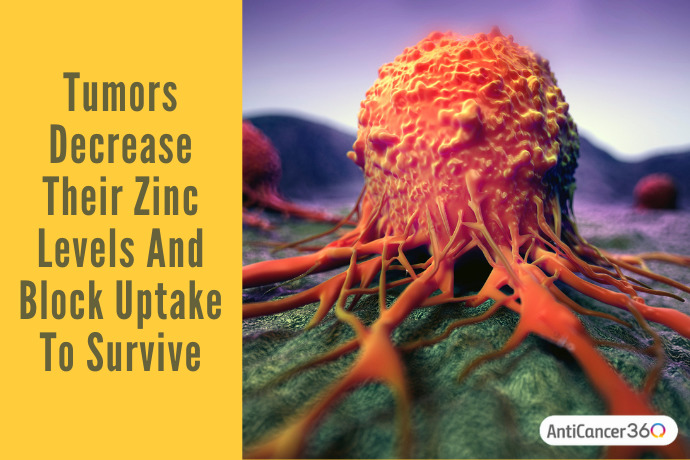
Quercetin, epigallocatechin-gallate (EGCG from green tea), and clioquinol (hydroxyquinolines) were studied to act as zinc ionophores, meaning that they cause zinc to pass through cell membranes [23]. This is a way to bypass the mutations in the zinc transport proteins so that we can get all the anticancer power of zinc where it needs to be, in the cancer cells. For this reason, we at AntiCancer360 will often use the stack of Zinc, Quercetin, and Green Tea as a powerful anticancer bundle.
A Note of Caution
Selenium has been shown to block the transport of zinc into cells and is likely best to be avoided when trying to use zinc supplementation for its anticancer effects [24]. This is one reason we often recommend against multivitamins and multiminerals during an integrative anticancer protocol.
Improved Outcomes for Certain Conventional Treatments and Reduced Side Effects
Aside from its own anticancer effects, zinc can be used to alleviate the side effects of radiation. Studies show that when used in conjunction with radiation therapy for head, neck, and throat cancers there is a trend towards reduced loss of taste, less dry mouth and oral pain, and improved mucositis and dermatitis (inflammation of the mucous membranes and skin) after zinc substitution [25],[26].
Other research has shown improvements in the feelings of sadness and anxiety, low mood, loss of interest in pleasures, reduced appetite, changes in body weight and sleep patterns, concentration disorders, and reduced cognitive abilities that folks experience as they traverse their cancer diagnosis and treatment protocols. This is likely due to its protective effects on the brain [27].
Another study showed that pairing zinc supplementation with tamoxifen induced induced greater levels of autophagy and cell death in MCF-7 breast cancer cell lines [28].
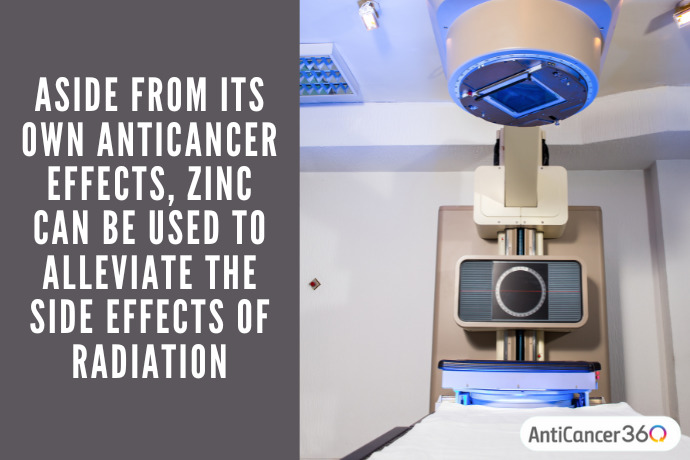
However, there is also research showing that zinc supplementation can interfere with the action of the anticancer drug disulfiram [29]. So it is important to know when to use zinc as part of the anticancer approach and when to avoid it.
Overall, there could be many unknown potential drug interactions that can happen with zinc, especially with chemotherapy and other cancer treatments. This is not a comprehensive list of possible interactions.
You must consult with your doctor or pharmacist before including any supplements in your program.
Dosage
The recommended dietary allowance (RDA) for zinc is 11 mg/day for men and 8 mg/day for women [30]. This is the amount to prevent a large deficiency and can be obtained with careful diet choices.
A typical dose to restore deficiency is 15-30mg daily, depending on one’s weight/sex [31].
The most absorbable form of zinc appears to be zinc picolinate [32]. Use this form to maximize results.
A toxic dose of zinc is quite high, estimated to be 27 g zinc/day in humans based on comparison with equivalent studies in rats and mice [33]. This is extremely high and unlikely to ever occur through oral supplementation as getting a dose of around 225–400 mg is enough to cause vomiting.
Side Effects
Nausea and Vomiting: this can particularly occur if zinc is taken on an empty stomach or in excessively high doses. Always take this nutrient with a significant meal to avoid this effect.
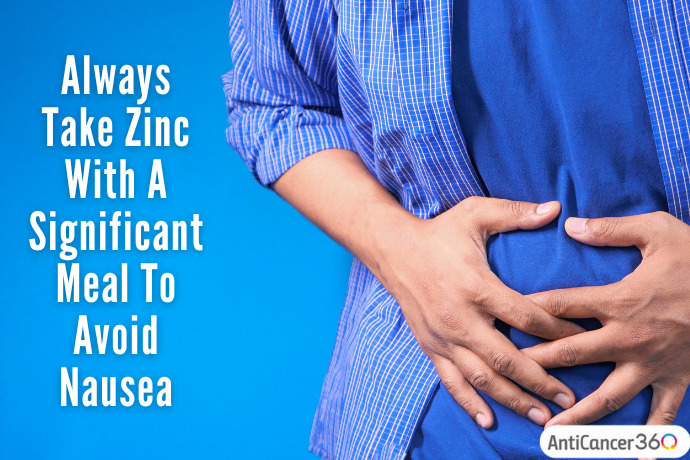
Copper deficiency: We actually will specifically use zinc to cause a copper deficiency as an anticancer approach (as mentioned above). However, it is important to realize that this should not be carried on for too long as copper is essential for forming healthy red and white blood cells, producing energy, building connective tissue, and neurotransmitter synthesis [34]. Therefore, it is important to supplement with copper once finished with a cytotoxic anticancer approach.
Immunosuppression: Long term, very high doses of zinc (>100mg/day) has the potential to suppress T cells and the immune system. Therefore, taking too high a dose as a cancer prevention could actually have the opposite effect and cause more cancers [35]. More reason to only use high doses of zinc during an aggressive anticancer protocol.
Zinc as Part of an Aggressive, Integrative Anticancer Approach
Zinc is a powerful nutrient that can significantly improve cancer outcomes with its judicial use. Due to its interactions with certain drugs it is important to know when not to use it or when it will improve the effects of certain drugs. Always speak with a qualified, integrative anticancer specialist before adding this powerful substance to an anticancer approach.
Ultimately, when using the “Aggressive Integrative Approach” to cancer, the goal is to fight cancer from every possible angle. This approach includes integrating natural supplements into your routine to help fight cancer, which can be done in a safe way that won’t interfere with your oncology treatments.
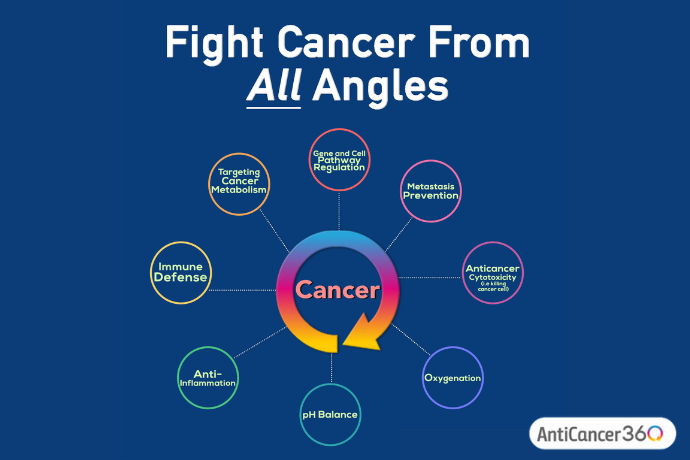
Depending on your unique situation, why not fight cancer from every possible angle?
How are you taking control? What role are you taking in your fight against cancer? What natural or dietary supplements have you tried and what changes have you noticed since you started them? What questions or concerns do you have about zinc supplementation? We would love to hear from you. Please leave questions or comments below!
Please talk with your healthcare professional and consider the risk-versus-benefit potential before starting zinc or any natural supplement.
Are You A Good Candidate For Our Program?
If you’d like to learn more about the AntiCancer360 approach and see if we can help you… please watch our free online webinar to learn more about our approach. Then at the end, you’ll be able to schedule a free call with someone from our team so that we can discuss your case in more detail.
Derrick Schull is a naturopathic doctor with a decade of experience helping others integrate the best natural and alternative interventions to meet their health goals. He has extensive experience in anticancer strategies, gut health, and brain health. As part of the AntiCancer360 team, Dr. Derrick coordinates your case-specific research, lab tests, oncology treatment info, and supplement-drug interactions to design a comprehensive program that’s tailored to your particular case.

